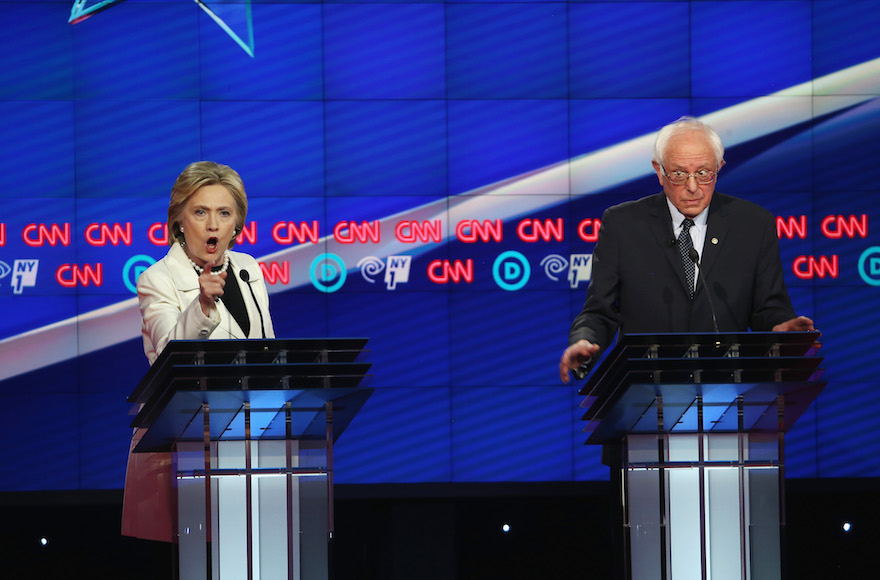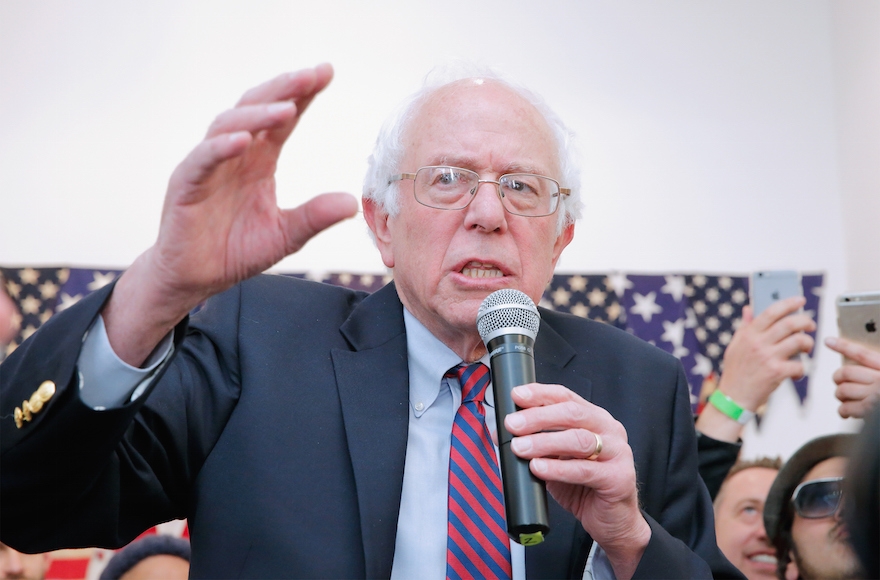Bernie Sanders has undeniably earned a place in history as “the first Jewish presidential candidate of a major party to win state nominating contests.” And until recently, that seemed like it would more or less sum up of his Jewish legacy as a candidate.
For most of the campaign, Sanders had seemed to avoid talking about his Jewishness. It makes some sense. The socialist senator from Vermont purports to speaks for “the 99 percent,” not the less-than-2-percent of Americans who are Jewish.
Then last week happened. Ahead of the April 19 primary in his native New York, the most Jewish of these United States, Sanders took three principled stands as a Jew — on anti-Semitism, his relationship with the Jewish community and Israel.
Suddenly, he became the rabbi not just for liberal Americans, but for liberal American Jews in particular. Whether that’s a good thing or bad thing for Jews depends on your perspective. But it happened. Here’s how.
Sanders drew a line between Israel criticism and anti-Semitism
https://www.youtube.com/watch?v=GgdfhFbsX9A
Sanders faced down an anti-Semitic questioner at a rally in Harlem on April 9, wagging his finger and expressing Jewish pride to applause from the African-American crowd.
The man asked Sanders’ about his Jewish identity and the time he spent in Israel in the 1960s, before segueing into assertions about Jewish control of finance.
“As you know, the Zionist Jews, they run the Federal Reserve, they run Wall Street,” the man said, to rising cries of protest from the crowd. Asked by a moderator to pose a question, he said: “What is your affiliation to the Jewish community?”
“That’s not what you’re asking,” Sanders retorted to applause. “I am proud to be Jewish.”
The crowd erupted in applause.
“I am a strong defender of Israel, but I also believe that we have got to pay attention to the needs of the Palestinian people,” Sanders said, to more applause.
The man continued to shout protests, but the crowd drowned him out, shouting “Bernie!”
It may have been an easy question to take a side on, but Sanders came down hard and fast. He made it clear: Jews are the 99 percent. And the crowd agreed — no small thing at a time when Jews on college campuses are accused of being a privileged class.
Sanders reached out to an alternative Jewish community

Simone Zimmerman (Facebook)
Jewish outreach directors are typically unknown to the general public, but well known within their political party and the Jewish community. Above all, they seek to reassure the skeptical that their candidate will hew to party lines, or at least stray not too far from them.
Simone Zimmerman, Sanders’ recent hire for the role, is nearly the opposite. Known to the J Street crowd and not within the party or the mainstream Jewish community, the young Brooklynite has been a strident critic of Israel’s occupation. After serving as J Street U’s student president, she went on to found If Not Now, a group that seeks to nudge Jewish groups to speak out against Israel’s policies on the Palestinians. She has a robust social media presence.
READ: In meeting with Orthodox, Trump reveals Israel advisers: His Jewish lawyers
By hiring Zimmerman to head his Jewish relations, Sanders could only have reassured those worried he would kow tow to the Democrats’ pro-Israel mainstream. Whether the choice was a political calculation or statement of principle, it represented an embrace of an alternative Jewish community: a younger and less communally affiliated demographic that wants a more critical American relationship with Israel.
The campaign later suspended Zimmerman for a year-old profane Facebook post. But a message was still delivered: There’s a Jewish politics that has little to do with the American Israel Public Affairs Committee.
Sanders sought to redefine ‘pro-Israel’

Hillary Clinton, left, and Sen. Bernie Sanders, I-Vt., debating during the CNN Democratic Presidential Primary Debate at the Duggal Greenhouse in the Brooklyn Navy Yard in New York City, April 14, 2016. (Justin Sullivan/Getty Images)
In a major debate — perhaps the most pivotal of the Democratic campaign — Sanders not only stuck to his guns on criticizing Israel, he turned those guns against Hillary Clinton. And he did so explicitly as a Jewish candidate.
Challenged on his characterization of Israel’s 2014 Gaza war as “disproportionate,” Sanders started off by laying out his pro-Israel credentials, wrapping them up in his Jewishness:
Well, as somebody who spent many months of my life when I was a kid in Israel, who has family in Israel, of course Israel has a right not only to defend themselves, but to live in peace and security without fear of terrorist attack. That is not a debate.
Then, he stood behind his claim:
But — but what you just read, yeah, I do believe that. Israel was subjected to terrorist attacks, has every right in the world to destroy terrorism. But we had in the Gaza area — not a very large area — some 10,000 civilians who were wounded and some 1,500 who were killed.
And he put Clinton, a former secretary of state, on the defensive, challenging her to defend her centrist pro-Israel line:
You evaded the question. The question is not does Israel have a right to respond, nor does Israel have a right to go after terrorists and destroy terrorism. That’s not the debate. Was their response disproportionate? I believe that it was, you have not answered that.
Finally — dancing on the third rail like a ballerina dodging the F Train — he brought AIPAC into it.
You gave a major speech to AIPAC, which obviously deals with the Middle East crisis, and you barely mentioned the Palestinians. And I think, again, it is a complicated issue and God knows for decades presidents, including President Clinton and others, Jimmy Carter and others have tried to do the right thing. All that I am saying is we cannot continue to be one-sided. There are two sides to the issue.
Sanders’ wedding of Jewish pride and Jewish disagreement — the pride presented as license to depart from the Jewish establishment consensus — isn’t entirely new, of course.
America has seen proud Jews, conflicted about their community, before. Think Jon Stewart, Philip Roth or Stephen Spielberg.
Sanders himself has dabbled in the role. He’s been criticizing Israel for much of his career, saying as far back as 1988 that the country overreacted in response to Palestinian attacks. But he’s also been defending Israel to left-wing audiences, in his strident way. His closest friends in Vermont are Jewish. He’s handy with a Hebrew blessing.
The difference is: Now he’s running to be president.
JTA has documented Jewish history in real-time for over a century. Keep our journalism strong by joining us in supporting independent, award-winning reporting.






